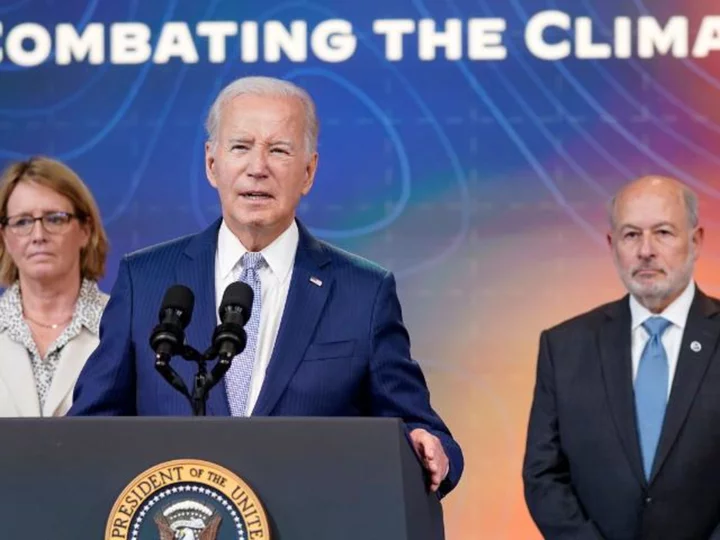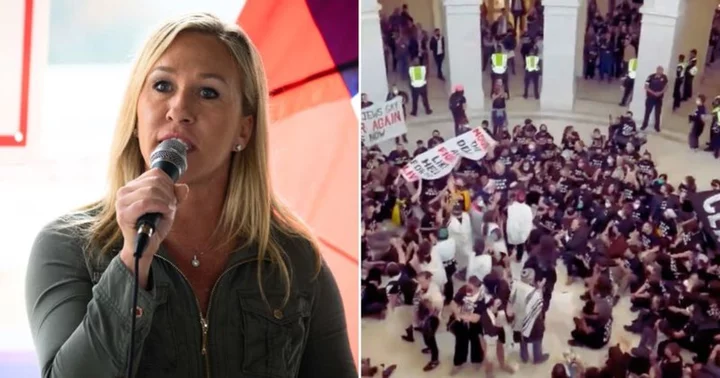President Joe Biden on Thursday unveiled a whole-of-government approach to protecting communities and workers from what he called the "real crisis" of extreme heat amid a recent spate of high temperatures and 150 million Americans are under heat alerts.
"Part of the reason we're here today is to get the word out so state and local governments know these resources are available and use them. I want the American people to know: Help is here and we're going to make it available to anyone who needs it," Biden said Thursday, calling on Americans to listen to public officials, stay indoors if vulnerable, know the signs of heat stroke, be careful on hot pavement, "always have a bottle of water" and take advantage of cooling centers.
Around 150 million people from coast to coast are under heat alerts Thursday after extreme heat expanded into the highly populated I-95 corridor, bringing the highest temperatures of the year there. The heat also won't let up in the South and Southwest, where heat-related deaths are climbing, emergency rooms are filling with heat-related burn victims and even animals are falling victim to heat illness.
Heat indexes -- a measure of what the temperature feels like when accounting for relative humidity -- are expected to top 100 degrees Fahrenheit across many areas in the Midwest, mid-Atlantic and Northeast through Friday.
Biden announced that he's asked acting Labor Secretary Julie Su to issue a "heat hazard alert" clarifying protections for workers.
"We should be protecting workers from hazardous conditions, and we will. And those states where they do not, I'm going to be calling them out," he warned.
Su, he said, will also work with her team, to "intensify enforcement, increasing inspection in high-risk industries like construction and agriculture."
The US Forest Service is awarding more than $1 billion in grants for the planting of trees that is aimed at helping to bring down temperatures in the long term.
The Department of Housing and Urban Development, he added, is providing "billions" to make buildings more efficient and more heat-resistant, as well as for the opening of cooling centers. The Department of Interior, he said, is using infrastructure funding to expand water storage capacity to deal with future droughts. And NOAA, the National Oceanic and Atmospheric Administration, is partnering with universities and impacted communities "to improve the nation's weather forecasts and its accuracy."
Biden pressed the importance of the local officials on the "front lines." Phoenix Mayor Kate Gallego and San Antonio Mayor Ron Nirenberg both participated in the conversation virtually, sharing their perspectives in dealing the extreme heat challenges.
The president also spoke more broadly about the impact of heat and climate change.
"I don't think anybody can deny the impact of climate change anymore... I don't know anybody who honestly believes climate change is not a serious problem," he said, pointing to droughts, hurricanes, wildfires and record temperatures.
Phoenix, he noted, has had temperatures over 110 degrees for 27 straight days, and he referenced ocean temperatures near Miami "like a hot tub" topping 100 degrees.
Heat, Biden said, has been "the number one weather-related killer," with 600 people dying annually from its effects, "more than from floods, hurricanes, and tornadoes in America combined." He told the story of an elderly woman in Phoenix who fell out of her wheelchair and had third-degree burns after five minutes on the hot ground, and noted farm workers and firefighters and construction workers who "risk their lives" working in extreme heat.
"Folks, we really want to pretend these things are normal? Experts say extreme heat is already costing America $100 billion a year and hits our most vulnerable the hardest: seniors, people experiencing homelessness who have nowhere to turn, disadvantaged communities. ... And it's threatening farms, fisheries, forests that so many families depend on to make a living."
He also went after "MAGA extremists" in Congress, who, he said, are trying to repeal legislative progress. And he called on Americans to visit heat.gov, a national integrated heat health information system.









